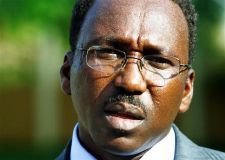Sudan govt, Darfur rebels fail to agree on security
By Silvia Aloisi
ABUJA, Oct 30 (Reuters) – Sudanese government delegates and Darfur rebels failed to reach agreement early on Saturday on a draft security protocol aimed at breaking a deadlock at peace negotiations in Nigeria.

|
|
Mohamed Tugod Lissan, head of the Sudanese Justice and Equity Movement (JEM) delegation to peace talks regarding the crisis in Darfur, speaks to journalists in Abuja, Nigeria, Thursday Oct. 28, 2004. |
Both sides met with African Union mediators late into the night to try to iron out their differences, but did not hold face-to-face negotiations, despite earlier pledges to do so.
International observers at the talks hope the framework will stop violence in Darfur that has driven more than 1.5 million people from their homes.
“There is still a gap … between the opinions of the parties,” Ahmed Tugod, chief negotiator for one of the two rebel movements fighting in Darfur, told reporters after the meeting.
Mediators said consultations would continue on Saturday and the talks would reconvene on Sunday.
The draft security proposal requires the government to make good on pledges to disarm its Arab and Janjaweed allies and identify any other militias it has been supporting.
The document also calls on both sides to cooperate with the AU cease-fire commission and say where their forces are located.
Rebels have voiced skepticism over the document, saying it does not mention a demand for a no-fly zone over Darfur or tell the government to pull back its forces to barracks.
“We don’t think that this will guarantee security on the ground,” said Abdullahi Osman, adviser to the rebel Justice and Equality Movement (JEM), before Friday night’s meeting.
Sudanese government representatives at the talks say the document is weak because there is no demand for rebels to garrison their forces.
DISEASE AND MALNUTRITION
The United Nations says Darfur is one of the world’s worst humanitarian crises, which has killed around 70,000 people through disease and malnutrition since March. There are no reliable figures for how many people have died in the fighting.
The top U.N. envoy in Sudan, Jan Pronk, has said a U.N. Security Council resolution demanding that the violence stop in Darfur and a humanitarian protocol drawn up in April mean the two sides need not discuss aid access or other security issues, which stalled a previous round of talks in Abuja.
Rebels have refused to sign a humanitarian deal, though they have agreed to it in principle, until an agreement on security had been reached.
A hundred Rwandan troops prepare to fly to Darfur on Saturday to join Nigerian soldiers who have just arrived in the vast arid region.
The AU force’s main job is to monitor a cease-fire agreed in April that each side accuses the other of breaking, but their mandate also includes protecting civilians threatened with immediate harm.
The Darfur rebellion began in February 2003 after years of low-level fighting between mainly African farmers and Arab nomads over scarce resources. The rebels accuse Khartoum of using the mounted Janjaweed to loot and burn non-Arab villages.
Khartoum denies the charges, arguing over the exact definition of the militia it says is one of many armed groups separate from paramilitary groups recognized by the government.
